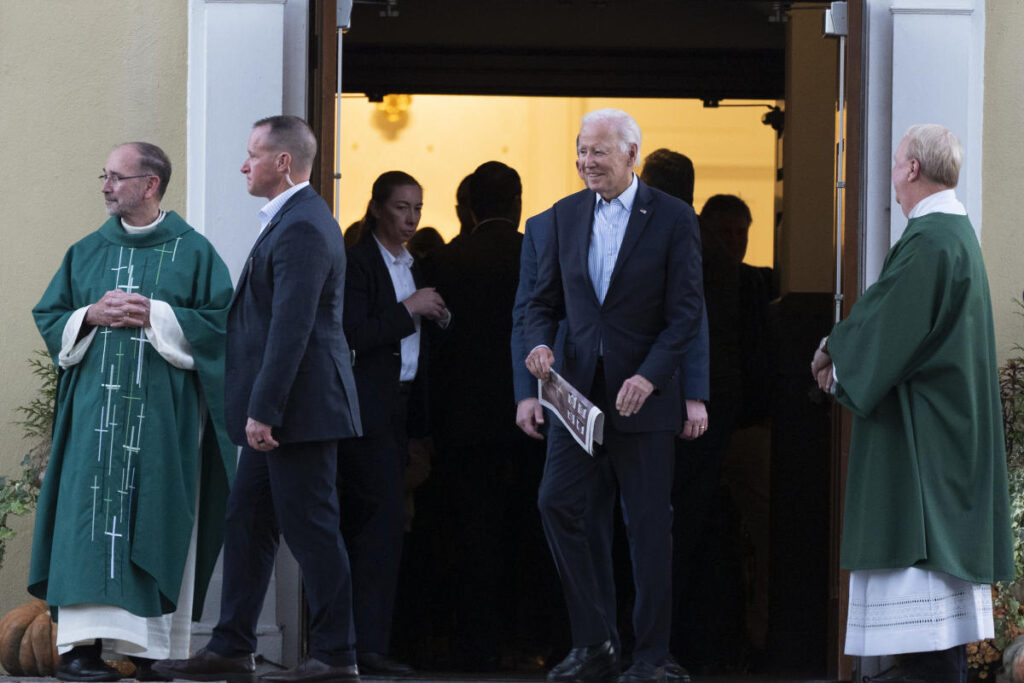President Joe Biden made a notable campaign appearance in Scranton, Pennsylvania, on Saturday, marking his support for Vice President Kamala Harris as she campaigns against former President Donald Trump and his allies. This visit served as both a personal homecoming and a political rallying point, where Biden delivered a fiery speech filled with his characteristic candidness. He focused on several key policy issues, particularly criticizing Trump for proposing tax cuts that favor the wealthy. Biden’s rhetoric was punctuated by colloquial anecdotes and a touch of humor, reflecting his connection to the working-class roots of Scranton. He urged the audience to recognize the implications of Republican policies on their communities and livelihoods.
Biden’s comments about supposed “macho” supporters of Trump garnered laughter from the crowd, illustrating his approach of mixing humor with political critique. His remarks about wanting to “smack” certain individuals resonated with the audience, demonstrating a blend of frustration and camaraderie. This unfiltered style has become a hallmark of Biden’s recent public appearances, drawing both cheers and critiques. While offering support for Harris, Biden’s focus seemed to shift back toward engaging Trump, as he thrives on the back-and-forth of political combat. His informal tone and direct language aim to foster a sense of solidarity among voters who may feel alienated by mainstream politics.
Throughout the week leading up to this rally, Biden had already stirred controversy with spontaneous remarks that reflected his unrestrained style. Following a rally where comedian Tony Hinchcliffe made disparaging comments about Puerto Rico, Biden responded pointedly, suggesting that any “garbage” present was more indicative of Trump’s supporters than the territory itself. This remark became contentious, leading to internal disagreements among White House officials about how best to present Biden’s comments. Such incidents highlight a noticeable trend of Biden stepping off the political script, striking a more personal tone while addressing pressing social issues.
In addition to directly tackling Trump’s policies, Biden’s speeches have become a platform for promoting civic responsibility and encouraging voter turnout. He framed the election as not just a political contest but a critical moment for families and communities. Throughout his Scranton address, he emphasized the importance of remembering one’s roots and voting for one’s loved ones and local communities. This refrain of loyalty to one’s origins and neighbors aligns with his long-standing political persona as a champion of working-class Americans.
However, despite the high-stakes rhetoric and emotional appeals, Biden has engaged in a relatively limited campaign role for Harris. His appearances, while driving passion and energy during rallies, have not significantly elevated her visibility or the urgency of her candidacy in the polls. The mixed responses to their joint campaign efforts may reflect underlying challenges within the Democratic campaign strategy and voter demographics, suggesting an ongoing audience engagement issue as Democrats head into crucial election cycles.
As Biden continues to navigate this complex political landscape, the balance between humor, passion, and policy critiques will define his effectiveness as both president and campaigner. His grounded approach resonates with many voters, but the challenge remains in addressing the broader Democratic agenda while energizing support for his vice president. The scrutiny following his unfiltered remarks underscores the heightened sensitivity and contentious nature of the current political environment, pushing Biden to adapt as he campaigns for Harris and tries to unite the party against a resurgent Trump-led Republican opposition.

